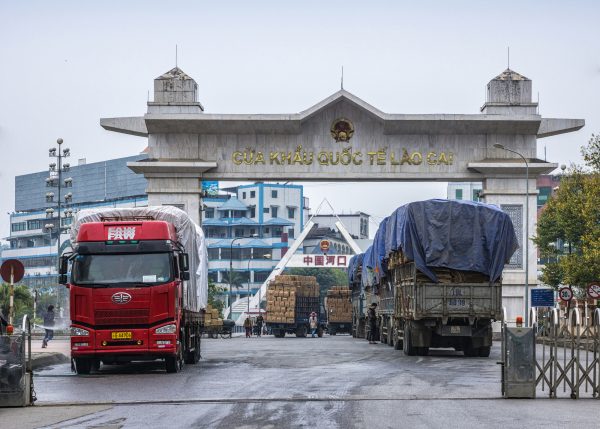U.S. President Joe Biden just announced that he would be “going to Vietnam shortly” to upgrade bilateral relations with the country, a move that the United States had pushed for several times but has not eventuated due to Vietnam’s concern for China’s retaliation. Some Vietnam watchers and Biden himself noted that the two countries could upgrade their “comprehensive partnership” directly to a “comprehensive strategic partnership,” bypassing the “strategic partnership,” which would put the U.S.-Vietnam relationship on par with that between Vietnam and China.
Vietnam may have changed its mind about the upgrade after China increased its incursions into Vietnamese waters and harassed Vietnamese oil and gas exploration activities in the South China Sea this year. Vietnam might choose to align more closely with an extra-regional power once it deems that deferring to China does not help lessen Chinese bullying.
Amid all the discussions about Chinese bullying and the U.S.-Vietnam upgrade, talks about Vietnam escaping China’s orbit are once again in the spotlight. “Escaping China’s orbit” or thoát Trung in Vietnamese, is inspired by Japanese scholar Fukuzawa Yukichi’s 1885 book “Leaving Asia,” which called for Japan to leave Asia and align with the West. The phrase is so popular in Vietnamese discourse that both state media and unaffiliated writers embrace it to discuss Vietnam’s options in the age of rising Chinese economic and military power. When China moved the Haiyang Shiyou 981 oil rig into Vietnamese waters in 2014, “escaping China’s orbit” became Vietnam’s number one topic of discussion. There is a public consensus that Vietnam must escape China’s orbit in order to protect its sovereignty and lower its economic dependence on China. The remaining question and a major point of contention is how. Vietnam’s alignment with the United States, or the West, is seen as one of the key means by which it might escape China’s orbit because only the United States has the power to help Vietnam balance against China.
However, talks about Vietnam escaping China’s orbit based on the Japanese experience are devoid of a logical basis. Writers tend to sensationalize the Japanese, or South Korean or Taiwanese, successes, based on a superficial analogy that an Asian country on China’s periphery can escape China’s orbit so long as it has the political will to consider itself an equal to China, adopt fundamental political reforms, and align itself with the West. This line of argument grants much agency to Vietnam and casts unjustifiable blame on the Communist Party of Vietnam (CPV) for its failure to escape China’s orbit, when on the contrary, it is Vietnam’s geopolitical position on China’s periphery that ultimately determines whether Vietnam can escape China’s orbit. The fact is that Vietnam under the CPV’s leadership did try to escape China’s orbit when it allied with the Soviet Union in 1978, only for such an escape to turn into an economic and political disaster due to Chinese retaliation. Vietnam had to return to China’s orbit on Chinese terms after the Soviet Union collapsed in 1991. Vietnam’s post-Cold War independent and neutral foreign policy reflects China’s military superiority over it and China’s preference to keep its periphery free from domination by another great power.
Diplomat Brief
Weekly Newsletter
Get briefed on the story of the week, and developing stories to watch across the Asia-Pacific.
Get the Newsletter
Vietnam is different from the other Asian countries that have successfully escaped China’s orbit because it shares a 1,400-kilometer land border with China. As a small country living next to a big country, Vietnam has few options to begin with, as China can exert its power asymmetry to shape Vietnam’s freedom of action with great consequences for Vietnam if it violates the perimeters set by China. From the Chinese perspective, keeping peripheral states under China’s orbit is a matter of vital national security interests. Consequently, China did not shy from the use of force to push any extra-regional powers out of its periphery, most notably its massive support for North Vietnam and North Korea against the United States, and its short war against Vietnam for its alliance with the Soviet Union in 1979. It is not a surprise that no land neighbor of China is allied with the United States. Vietnam remaining in China’s orbit better reflects the asymmetric power relationship and China’s political will to keep Vietnam neutral than Vietnam’s reluctance to escape these bonds.
What makes geography such a determinative factor in Vietnam’s past failed attempts to escape China’s orbit? The answer has to do with China’s use of force in managing its relations with its neighbors. The East Asian regional order is built on China’s military power, and geography matters to force projection. For a land power like China, it is easier to move forces on land than at sea. China cannot use or credibly threaten to use force against its neighbors to keep them in line when it cannot project force in the first place. Japan, South Korea, and Taiwan can escape China’s orbit simply because they do not share a land border with China and are islands by nature or by political design. Power projection capability also explains why the Asia-Pacific landscape is split between a land power (China) dominating the Asian landmass and a sea power (the United States) overlooking the Asian ocean. As China is modernizing its maritime force projection capability, the United States has a legitimate fear of being pushed out beyond the First Island Chain.
Another dimension of China’s use of force is its preference for coercion rather than brute force to achieve its objectives. As Sun Tzu noted, “to subdue the enemy without fighting is the acme of skill.” Those who claim that Vietnam can and should escape China’s orbit often solely focus on Vietnam’s ability to defend itself against past Chinese invasions as a basis for defying its northern neighbor. So long as Vietnam can make a Chinese invasion costly, Vietnam does not have to be afraid of Chinese military retaliations and should be free to chart its own course. However, this view ignores the political use of force. China does not need to invade Vietnam or occupy it to succeed in keeping Vietnam under its tutelage. The China-Vietnam power asymmetry and geographical proximity allow Beijing to dangle the threat of a costly invasion with maximum political and economic costs on Vietnam without having to actually carry out the threat. As a small power, Vietnam cannot afford to call China’s bluff because China has in the past demonstrated its ability to punish Vietnam.
Without a doubt, Vietnam succeeded in stopping a Chinese invasion in 1979 by inflicting great casualties by employing a porcupine strategy. However, it is what came after the Chinese withdrawal that tells the full story. China adopted a “bleeding Vietnam white” strategy by stationing a large number of troops along the China-Vietnam border to force Vietnam into an arms race that it could not win. China frequently shelled Vietnamese border towns and military stations and made a number of limited encroachments, all of which served to remind Vietnam of a second Chinese invasion and the high costs of “escaping China’s orbit.” Despite China’s underperformance during the 1979 war, it emerged victorious in 1991 as Vietnam had to give in to Chinese comprehensive pressure as its economy could not remain on an indefinite war footing. China achieved its political objective of neutralizing Vietnam without having to win a war against it or its treaty ally, the Soviet Union.
Advertisement
An upgraded U.S.-Vietnam partnership in response to Chinese bullying at sea is certainly a welcoming development, as it opens an alternative option for Vietnam. However, it will be too much to argue that a hypothetical U.S.-Vietnam Strategic Partnership, or even a Comprehensive Strategic Partnership, will help Vietnam escape China’s orbit. Vietnam cannot escape China’s orbit as long as China remains a powerful and united political entity with a strong political will to exert its dominance over its periphery. Vietnam may have defeated China on the battlefield many times, but it has continuously acquiesced to a China-led regional order throughout its history, except for several interregnums when China was weak, or Vietnam procured credible and massive support from an extra-regional power. The United States should respect Vietnam’s longstanding concern about Chinese retaliations and not push upgrade too hard and too soon. Vietnam’s freedom of action is and will continue to be primarily determined by China. For Vietnam, staying within China’s orbit has its costs, but it is still better than trying – and failing – to escape.

